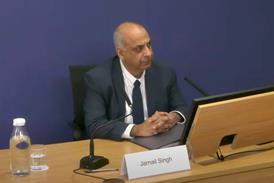The hope was that despite the recent uncertainty related to Brexit, 2020 would see stability and consumer confidence return to the residential property market. However, that hope was soon dashed as the world faced up to the Covid-19 pandemic, impacting upon all aspects of our lives.

Property transactions almost ground to a halt as social distancing and lockdown took hold, with the market effectively shutting down in March.
Since then, there has been admirable effort across the conveyancing industry, including from solicitors, to get things fully up and running again.
Sector bodies including the Law Society came together to produce cross-industry guidance, to support government plans to re-open the housing market.
The Law Society, meanwhile, unveiled sector-specific guidance providing conveyancing solicitors with information to enable sales and purchases to resume safely and providing guidance in relation to the timings of exchange and completion.
Technological solutions were also accelerated in the wake of social distancing with HM Land Registry agreeing to accept Mercury-style signatures and then to issue guidance in relation to the use of witnessed electronic signatures. The Land Registry also encouraged discussions about the use of cryptographic and biometric checking of identity of buyers and sellers particularly in connection with the use of Qualified Electronic Signatures.
When the market reopened in May, and as lockdown eased, measures were put in place to allow chains of moves to take place safely and the volume of work for solicitors quickly increased.
Zoopla estimated that 373,000 property transactions were paused during lockdown and when it eased, those consumers were finally able to move.
Changes to the way we work had led people to reassess their properties and location, with prospective home buyers looking at larger homes by the sea and in the country.
The stamp duty land tax (SDLT) holiday began in July for purchases of up to £500,000 in England and Northern Ireland. In Wales, the land transaction tax threshold was increased to £250,000. This government stimulus was welcomed by the Law Society.
The pent-up demand, desire to move due to changing work practices and the property tax reductions led to momentum in the market.
Nationwide reported that property prices reached an all-time high in August and many sellers found a buyer within a week, more than at any point over the past decade, according to Rightmove. Mortgage approvals for house purchase increased to 84,700 in August, the highest since October 2007, reported the Bank of England.
The great increase in the volume of work has created a challenging time for conveyancing solicitors.
Firms who furloughed employees during the lockdown have seen fewer staff having to deal with more work and will be under pressure to complete moves before the March 31 SDLT and LTT holiday deadline and the withdrawal of the Help to Buy scheme in its current form in March 2021. The Easter weekend follows, traditionally a busy and popular time for people wanting to move.
Consumers need to act now if they want to take advantage of Help to Buy and the tax concession before the SDLT and LTT holidays come to an end.
Overseas buyers should particularly act fast as they face an additional 2% surcharge from April.
The increased caution on the part of some lenders and the difficulties in obtaining EWS1 certificates for building safety have contributed to some of the difficulties and delays in the market.
There is also caution over the future of the market as the government furlough scheme and mortgage holidays come to an end, redundancies and unemployment rise and people struggle to get mortgage approvals. Some experts predict a fall in property prices post the SDLT holiday.
The government must remain vigilant to ensure the right balance of stability, fairness and confidence in the market is in place once the stamp duty holiday ends.
Buyers and sellers can play their part by embracing the suggestions in the new Home Buying and Selling Pledge. The pledge indicates some of the tasks buyers and sellers can perform early in the process, which can assist in progressing transactions more effectively.
Kate Faulkner, who leads the House Buying and Selling Group, will be speaking about restoring consumer confidence in property at the Law Society’s national property law conference.
Conveyancing solicitors deserve recognition for their efforts in keeping clients moving during such a difficult period.
With more challenges ahead, the property law conference can offer updates and insights from experts on the latest developments in key areas such as stamp duty land tax, planning law, residential and commercial property law.
Delegates will also:
- Be updated on the latest developments in residential conveyancing
- Understand responsibilities under the new Anti-Money Laundering regulations
- Updated on commercial property documents and practice points
- Gain insight into how conveyancing might develop in the future
The conference – now in its 19th year – is taking place virtually as a series of interactive and topical webinars from 6 to 8 October.
Find out more about the conference here. It is free for CQS/Property Section members and £145 + VAT for non-members.
Stamp duty land tax holiday explained
Suzanne O’Hara, head of the specialist SDLT advisory service at Moore (NI), explains that the phrase ‘holiday’ is slightly misleading, as there will still be SDLT to pay for properties valued at more than £500,000 or for properties below £500,000 on which the 3% surcharge applies (for example, if a second or additional residential property is purchased or if the purchaser is a company).
Nevertheless, the SDLT ‘holiday’ can provide up to £15,000 in tax savings on standard residential property purchases in England before 31 March 2021. The application of the 3% surcharge can be complex and still requires consideration during the holiday period.
Moreover, the holiday only applies to residential property. 'Therefore, commercial and mixed-use transactions will receive no benefit during the holiday period. Conversely, for transactions with consideration up to £1,215,000 it will be more beneficial to be treated as residential property during the holiday period. Getting the classification of the property correct remains of utmost importance to ensure the correct amount of SDLT is paid.'
She suggests that the potential SDLT savings can be increased even more when applied to transactions which are eligible for Multiple Dwellings Relief. 'Solicitors should remain vigilant for transactions which could be eligible for relief, which include cases involving annexes/granny flats, given the potential enhanced savings during the holiday period (and an increasingly litigious society).'
Finally, she notes the increase in transactions involving the transfer of personally held property portfolios to limited companies since the announcement of the holiday as a further planning opportunity for clients.
'Many investors are taking advantage of the reduced SDLT exposure to transfer the properties so that they can claim full relief for the interest costs (since April 2020 interest costs are now restricted for income tax purposes). This is likely to be of interest to many property investors and solicitors may see an increase in conveyances in such circumstances.'
Suzanne is presenting an interactive live webinar during the Law Society’s national property law conference on the new SDLT holiday and how this interacts with the existing rules.
Simon Davis is president of the Law Society of England and Wales





























1 Reader's comment